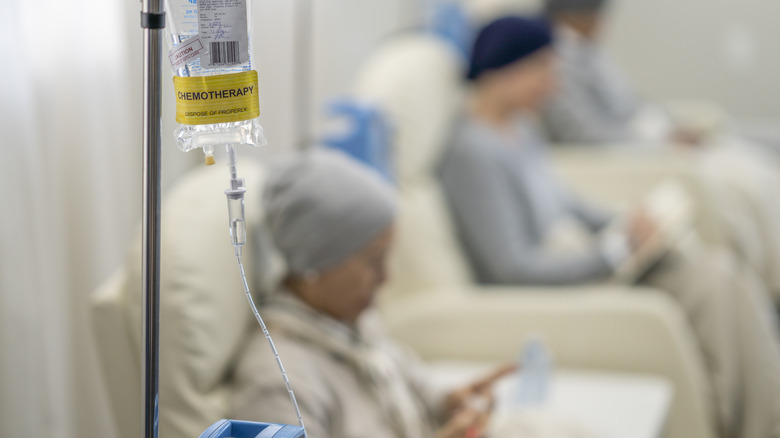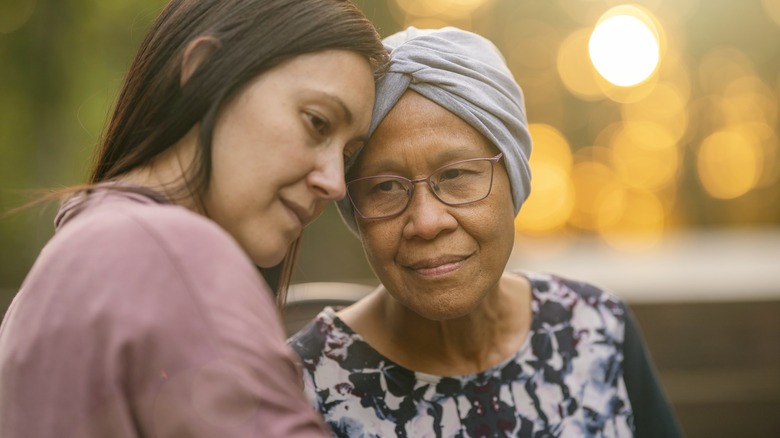What Life Is Like After A Stomach Cancer Diagnosis
For people who don't have a loved one dealing with chronic disease or have never experienced it themselves, the realities of living with something like stomach cancer can seem unfathomable. But when you've been through a diagnosis yourself, you know about how the disease can change your life overnight.
The world's interest in stomach cancer, also known as gastric cancer, would've probably been piqued when Toby Keith's cause of death was explained. When cells in any part of your stomach begin to grow abnormally, tumors develop, and although the cancer typically grows from the inner lining of your stomach, it can also originate in the gastroesophageal junction, which is what's commonly seen in the U.S. The incidence of gastric cancer is declining in the U.S. but it remains the fifth most common type of cancer globally (per World Cancer Research Fund International).
Being over 60 years of age, being male, and being native to East Asia, Eastern Europe, and South and Central America are considered risk factors. Obesity, smoking, and alcohol use are risk factors, too. Those who've had prior stomach surgery and those who eat a diet heavy in salt and processed meat and poor in fruits and vegetables are also more at risk.
One of the main ways in which a stomach cancer diagnosis changes your life has to do with how the disease makes you feel. Fatigue, fullness, heartburn, bloating, gassiness, indigestion, nausea, vomiting, trouble swallowing, stomach pain, tar-like poop, vomiting blood, and weight loss are all symptoms. How stomach cancer is treated can impact your quality of life too.
Treatment and nutrition after stomach cancer diagnosis
Early detection can greatly direct treatment plans and thereby your quality of life. While stage 1 stomach cancer might only include surgery to remove the tumor, stages 2, 3, and 4 will look a lot different. Chemotherapy, radiation, targeted therapy, and immunotherapy can be part of the treatment plan. Using anticancer drugs like fluorouracil and cisplatin to kill cancer cells via chemotherapy can have immediate or delayed effects, depending on the medication, combination of treatments, and the person's general health. Loss of appetite, nausea, vomiting, diarrhea, fatigue, bleeding, sore throat, hair loss, skin issues, and tingling in hands and feet are considered side effects of chemotherapy and radiation.
With targeted therapy (using drugs to single out specific molecules such as proteins in the cancer cells), the side effects can be similar, with the addition of stomach pain, muscle and joint pain, headaches, and heart issues. Immunotherapy (using your own immune system to fight the tumor) can make someone feel weak, tired, and short of breath. Fever, cough, nausea, itching, skin issues, muscle and joint pain, loss of appetite, and irregular bowel movements can be part of the side effects, too.
How you consume food and what you can consume could also look different, particularly after stomach surgery. You may need to eat smaller meals more frequently rather than three large meals. You might experience dumping syndrome, characterized by nausea, diarrhea, sweating, and flushing after eating. This can happen when all or part of your stomach is removed. Using feeding tubes to get in nutrition, taking nutritional supplements, and working with a dietician can all become a part of your life.
Stomach cancer and mental health
One of the topics that isn't addressed enough in stomach cancer-related data is how the disease can affect your mental health. Apart from the shock, confusion, despair, rage, and fear that come with the initial diagnosis, anxiety can become an everyday companion. Even if the cancer was removed, it is not uncommon to live with a fear of recurrence.
While some people living with gastric cancer turn to outlets like journaling and yoga to cope with the disease and all that comes with it, others have found speaking with their oncologist, therapist, social worker, or clergy member about concerns to be helpful. Having a supportive network of friends and family around you can also greatly influence your quality of life after a stomach cancer diagnosis, whether the prognosis is hopeful or not. Training your thoughts to remain mindful, pulling your attention to the present, and trying to enjoy the little joys and process the sorrows of the day can all be helpful ways to not let your fears cause undue stress.
Dealing with healthcare providers, especially when new information is being given to you about your diagnosis, can be frightening. Making a list of concerns before your visit can help. Finding and connecting with people going through the same thing you are can also be helpful for some. And if you're reading this article on behalf of a loved one, it doesn't hurt to know the sneaky signs of stomach cancer you shouldn't ignore. Knowledge about the disease can go a long way in detecting it early and having a better quality of life.
If you or someone you know needs help with mental health, please contact the Crisis Text Line by texting HOME to 741741, call the National Alliance on Mental Illness helpline at 1-800-950-NAMI (6264), or visit the National Institute of Mental Health website.



